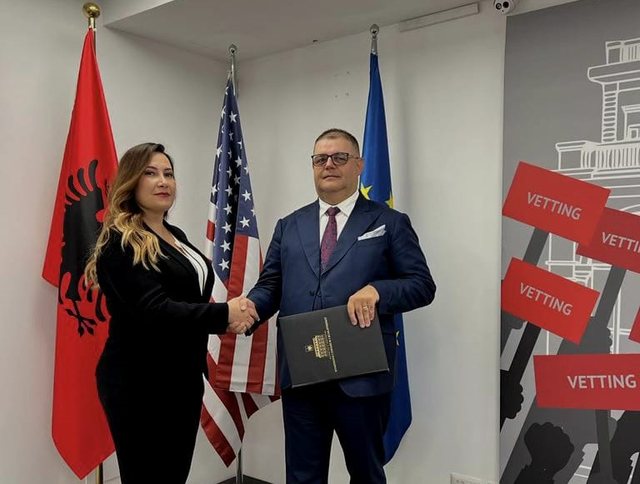
 Flash News
Flash News
The Supreme Court described as hypothetical the claims of KPK about the consequences that transparency would bring for the private sponsor

The Administrative College of the Supreme Court has described as hypothetical the submissions of the Independent Qualification Commission, KPK about the arrival of serious and irreparable consequences from the execution of the final decision of the Court of Administrative Appeals, which forces it to publish the name of the sponsor of an activity at the luxury resort "Marina Bay" in Vlora, in September 2021.
In the reasoned decision of the Supreme Court, the entire progress of the process is presented, from the submission of the request for information that BIRN addressed to the Commission regarding the sources of expenses of this activity; the process before the Commissioner for the Right to Information and Protection of Personal Data that ordered the full copy of the sponsorship agreement to be made available; the decision-making of the Administrative Court of the First Instance of Tirana, which gave the right to the KPK, taking into consideration the financial consequences for this institution; the decision of the Court of Administrative Appeals that definitively obliges the provision of complete data; as well as the Commission's detailed submissions in the request for the suspension of the execution of this decision, which appear to be similar to the claims presented in the appeal that is expected to be examined on June 11.
"The panel finds that the petitioner has not presented any legal argument in function of the request for the suspension of the execution of the decision of the Administrative Court of Appeal. The reasons presented in the request for the suspension of the execution of the decision of the Administrative Court of Appeal basically aim to oppose the legality of this decision-making", assesses the Administrative College, chaired by judge Sokol Sadushi and with members judges Gentian Medja and Sokol Ngresi.
They reason that, for the appointment by the court of temporary procedural measures, the law requires the existence of a reasonable doubt, that the subjective right or the legal interest of the subject suing or complaining is violated by the actions or inactions of the opposing party or the decision of the court. They add that it is required that in the circumstances of the case there is an immediate and known risk of causing serious and irreparable damage if the temporary measure is not taken by the court.
According to the Supreme Court, the arguments presented by the requesting party must be concrete and refer to facts and evidence that prove their existence.
"As a general rule, only the legal reasons for the content of the appeal are not sufficient to accept the request for the suspension of the execution of the final court decision, since the substantive review of the appeal differs from the review of the request for suspension," says the Court of Up.
"The lack of these legal arguments in the presented request leads to the rejection of the request for suspension", the Administrative College assesses and underlines that court decisions are mandatory to be implemented.
"Regarding the specific case, the College notes that the petitioner hypothetically presents the possibility of serious and irreparable consequences by connecting his position with issues that do not belong to the procedure of suspending the execution of a final decision, but to a phase other related to the legal basis of the causes of recourse", the Supreme Court notes, and based on these reasons, it has decided not to accept the request for the suspension of the execution of the decision that forces the KPK to make available a full copy of the document requested.
The Independent Qualification Commission is a constitutional institution, created within the framework of the Justice Reform for the vetting of judges and prosecutors, with the ultimate goal of restoring public confidence in justice.
Throughout his mandate, hundreds of magistrates have been accountable to the KPK and have been penalized with dismissal for gifts or sponsorships received from third parties, which have been assessed in light of a potential conflict or apparent interest. KPK members themselves refuse to be held to the same standard, keeping secret the name of a sponsor who funded an event in 2021.
"[…]On what basis does the standard of transparency, already applied during the vettiung process of judges in office, not be applied to quasi-judge commissioners?", asks the Administrative Appeals panel. Reporter.al
Latest news


What does Zelenskyy have more than Zegjineja?
2025-07-05 18:45:26

Fiscal peace, but at a cost
2025-07-05 18:00:10
'Bankers' tax evasion, Chinese CEO and former director jailed
2025-07-05 17:39:21
Kyle Walker joins English club on two-year deal
2025-07-05 17:20:24
Two cars collide on the Saranda-Delvina axis, 4 injured
2025-07-05 17:05:29
Touching gesture! Liverpool will pay Jota's family's salary until 2027
2025-07-05 16:45:18
The zodiac signs that cheat most often
2025-07-05 16:25:53

"I asked for the dismissals", Dredha tries to soften Rama's 'blow' in Vlora
2025-07-05 15:48:49
Bomb threat in Parliament, prosecutor: It was a lie
2025-07-05 15:22:28

Bardhi: The recount revealed how greedy Zeqine Balluku is in stealing
2025-07-05 14:44:29
Knife wound on the secondary road Tirana-Durrës, perpetrator sought
2025-07-05 14:37:54
Tears and pain, Diogo Jota is escorted to his final home
2025-07-05 14:21:34
Success starts with yourself! Simple ways to invest in personal development
2025-07-05 13:58:50
Unlicensed firearms found in apartment, 50-year-old arrested in Lushnje
2025-07-05 13:43:11

Tirana Court remands Skerdi Sina to prison
2025-07-05 12:59:34
Cocaine laboratory in Greece, here are the Albanians arrested and wanted
2025-07-05 12:40:16
Directed Justice/Vangjeli: SPAK does not investigate any scandal involving Rama
2025-07-05 12:22:03

Bomb alert, Police remove MPs and media from Kosovo Parliament building
2025-07-05 11:48:16
"The will of the people" and the irony of ordered resignations
2025-07-05 11:32:05
Summer drowning risk: How to enjoy the water without risking your life
2025-07-05 11:20:27
Fire situation in the country, 16 fires reported in 24 hours, 4 still active
2025-07-05 11:07:04
Car hits pedestrian at white lines, injured in serious condition in Vlora
2025-07-05 10:59:58
Mosquito-borne diseases are a growing problem in Europe
2025-07-05 10:44:13



One of Sweden's most dangerous and wanted criminals arrested in Turkey
2025-07-05 09:38:29
Foreign exchange/ How much foreign currencies are bought and sold today
2025-07-05 09:18:38

"Don't be influenced by the opinions of others", today's horoscope
2025-07-05 08:40:50

Morning Post/ In 2 lines: What mattered yesterday in Albania
2025-07-05 08:02:07

Trump says he's ready to raise tariffs to 70% on some countries
2025-07-04 22:35:52
Tre shenjat e zodiakut që do ‘pasurohen’ në Korrik
2025-07-04 22:05:09
Gaza War: Hamas Accepts US Proposal for 60-Day Ceasefire
2025-07-04 21:50:10
Autocracy in Albania, Fuga: Governance has gotten out of control
2025-07-04 21:40:51
Meta: Agriculture on credit, the new fraud!
2025-07-04 21:26:39




Vote recount in Durrës ends without changes
2025-07-04 20:12:54
Gas station explodes in Rome, 25 injured (VIDEO)
2025-07-04 20:00:20

These afternoon habits often sabotage weight loss
2025-07-04 19:39:28
Former Arsenal player Thomas Partey accused of rape
2025-07-04 19:24:21
Shepherd disappears without a trace in Delvina
2025-07-04 19:14:31

Bardho gave Zegjine's mandate/Braho: Unfair! It violates the electoral system
2025-07-04 19:01:08


Rapid developments in the Sultanates!
2025-07-04 18:00:06



Italy tightens rules for skateboard traffic
2025-07-04 17:20:18

Unusual for the time, dense fog covers the coast of Vlora
2025-07-04 16:48:01


Accident on the Shkodra-Lezhë axis, one dead and 3 injured
2025-07-04 16:14:19
Albania with fewer requests for asylum and Albanian citizenship in 2024
2025-07-04 16:06:57

Albania last for quality of life, DP: Technical government is the solution!
2025-07-04 15:42:30
Nico Williams says "No" to Barcelona, signs with Athletic Club until 2035
2025-07-04 15:33:35
Fires in the country, four fires are still active, what is the situation?
2025-07-04 15:24:20

Summer brings big changes for these 4 zodiac signs
2025-07-04 15:00:04
Osmani: MPs need to agree to a secret ballot for the Speaker of Parliament
2025-07-04 14:51:09
Serious accident on the Peqin-Elbasan axis, two injured
2025-07-04 14:37:56

GJKKO leaves in force the security measure for the head of the KPP
2025-07-04 13:58:17
Who will replace Ilir Meta and take over the leadership of the PL?
2025-07-04 13:50:36
Berisha: Dismissal of directors in Vlora, another act of 'scapegoats'
2025-07-04 13:41:46




Librazhd/ In a serious psychological state, the young man consumes pesticides
2025-07-04 13:05:07


Weapons trafficked from Kosovo to Albania, two arrested, 8 pistols seized
2025-07-04 12:33:28
Konsumimi i tepërt i çokollatës, ja cilat janë dëmet që shkakton në organizëm
2025-07-04 12:23:35

Fires in the country, 21 fires in the last 24 hours, 4 still active
2025-07-04 12:00:19
WB calls for debt transparency: Albania to publish details of every loan
2025-07-04 11:50:05
Changes in the State Police, new names expected to lead 5 police stations
2025-07-04 11:40:06

The race for the head of the BKH, the third phase on July 11
2025-07-04 11:20:23

Toxic phrases that show your relationship is in trouble
2025-07-04 11:00:10

